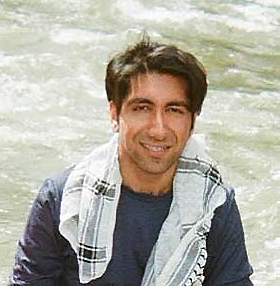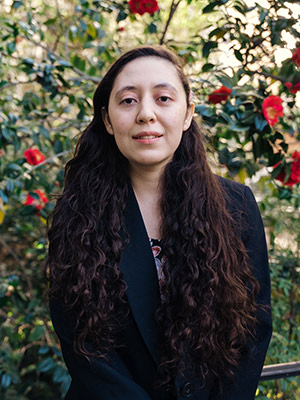
By Gwyneth K. Shaw
When the United States pulled its final troops from Afghanistan in August 2021, the Taliban’s swift takeover of the government and military sparked a humanitarian crisis that’s still reverberating. More than 100,000 Afghans fled their nation with American help, and those who entered the U.S. did so on a two-year permit that will expire this summer.
With the clock ticking, many Afghan evacuees are seeking asylum and permission to stay here long term. But the process is famously difficult, both to decipher and to complete, creating a huge need for legal expertise.
Enter Berkeley Law’s Asylum Law Practicum. This spring, students in the course worked with Bay Area Afghan evacuees, under the supervision of attorneys from Jewish Family & Community Services East Bay (JFCS), to help them submit their asylum applications. Lecturer Kyra Lilien ’06, director of the Immigration Legal Services Program at JFCS, teaches the practicum and the accompanying seminar course.
“Given the incredible number of Afghan asylum seekers who have arrived in the East Bay these last two years, the local legal service providers have been completely inundated with requests for assistance,” says Lilien, whose organization has resettled more than 1,000 Afghans since the U.S. withdrawal. “Many Afghans cannot access the legal assistance representation which they so desperately need.”

Students studied U.S. asylum law and learned about its roots in the 1951 Refugee Convention, then were paired with Afghan families who needed help. After multiple meetings to develop their claims — focusing on their fears of returning to a Taliban-dominated country — the students completed full asylum applications, including their clients’ declarations, personal evidence, and country reports. They also prepared a letter brief to bolster these claims.
Muhammad Yusuf Tarr ’24, who started law school as the events in Afghanistan unfolded, was drawn to the course because of its direct service orientation.
“While I enjoy my law school classes, sitting in a lecture hall while knowing the state of global affairs feels jarring. The practicum provided me an opportunity that felt true to why I came to law school in the first place — to help people,” he says. “Growing up as a Muslim-American, I often saw people with faces like mine and names like mine fleeing from war-torn countries, so lending my skills to help another family through a process as arduous as asylum feels like the least that I can do.”
Easing a heavy burden
Tarr says he can’t imagine how hard it is for his clients to cope with an unfamiliar legal process — including an overwhelming amount of paperwork, which must be kept meticulously organized — on top of navigating everyday life.
“I am constantly stunned at how they have handled not only the traumas of their past, but how they have adjusted in the U.S.,” he says. “The most rewarding aspect is the belief in our clients, their stories, and their desire to stay in the U.S. While our meetings may be hard at times, just seeing the optimism that they have in such an unknowing process creates an energy that truly allows me to put my best foot forward and gives me hope in their case.”

Meeting at the JFCS offices, virtually, and even occasionally in a client’s home, practicum students puzzled through each story and mapped out a plan. In one case, Tarr and Zabdi Salazar ’24 realized there was an easier path to asylum for their client, much to everyone’s excitement.
Salazar says she found the work of learning and compiling the client’s story profoundly meaningful. Helping to make a difference in the lives of refugees at a time of such uncertainty has been an honor, she adds.
The language barrier has been challenging, Salazar says, both because an asylum application requires a lot of details and understanding a client’s narrative is so important. The process takes time and a lot of patience, she says — on both sides. She praises Lilien and JFCS immigration attorney Karen Bird, who also helps supervise their work, for being a great resource.
“We often had to ask some of the same questions a few times and take pauses to make sure we are all on the same page about certain details. Still, Yusuf and I are very grateful about our client’s patience with us, since we know it can be very difficult to recall and explain traumatic events,” Salazar says. “Kyra and Karen have been phenomenal and have made all the challenging aspects of this practicum manageable. They have helped us navigate the entire process and have always readily answered our questions.”
Tarr and Salazar’s efforts let JFCS quickly file their client family’s asylum application, Lilien says.
“Yusuf and Zabdi represented a family that faced serious and imminent threat of harm due to their prior involvement with U.S. forces in Afghanistan,” Lilien says. “Their diligent work and careful preparation of the case put their clients on a path to permanent status in the U.S., allowing them to finally put down roots and begin to rebuild their lives here.”
An ongoing effort
The practicum builds on some of the work done by the Berkeley Law Afghanistan Project, founded in August 2021 to both offer pro bono help to Afghans facing legal impediments to leaving the nation and preserve evidence of human rights abuses committed by the Taliban. Some of the course’s students worked on that project as well.
Tarr says his practicum experience has shaped his professional trajectory: He hopes to connect law firms and immigration groups to create new pro bono partnerships once he’s established at a firm after graduating.
“This work reiterates that we all have an obligation to each other as human beings,” he says. “Diversity is an issue the legal profession is taking on, and hopefully with someone like me, who is passionate about serving members of my own community, I can use this privilege to obtain greater material resources and legal support for those who need it.”
He and Salazar both hope the asylum practicum will continue, offering help to refugees from other nations as well. With asylum law so heavily connected to current affairs, Tarr sees a need for it “so long as violence, human rights violations, and wars occur.”
“Our client and his family have also gone through much hardship in the United States,” Salazar says. “I’m grateful that I can be of help in alleviating some of our client’s worries by assisting with their asylum case.”